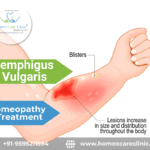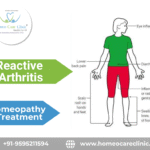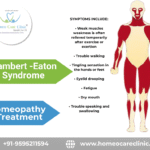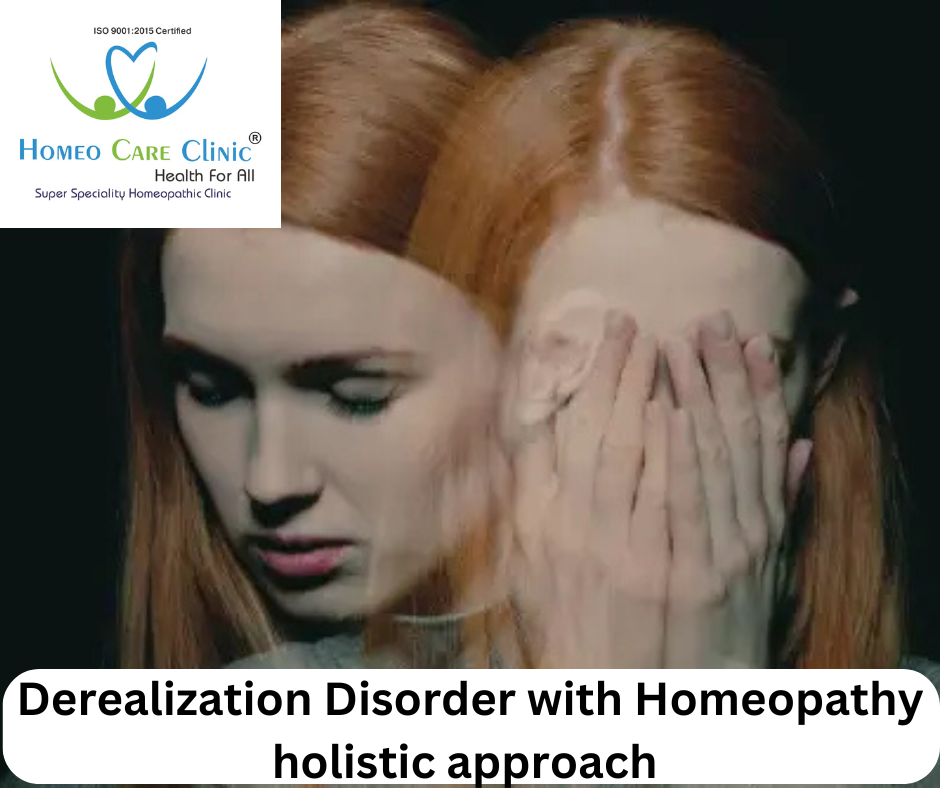Introduction
Depersonalization/Derealization Disorder (DPDR) is a dissociative disorder characterized by persistent or recurrent feelings of detachment from oneself (depersonalization) or the environment (derealization). Individuals with DPDR may feel as though they are observing themselves from outside their body or that the world around them is unreal. While these symptoms can be distressing, DPDR is not a psychotic disorder, as individuals remain aware that their experiences are not reality.
Conventional treatments include psychotherapy, medication, and stress management. However, homeopathy offers a holistic approach to treating DPDR, focusing on the individual’s physical, mental, and emotional well-being.
What is Depersonalization/Derealization Disorder?
DPDR is a complex mental health condition that can occur independently or as part of other disorders like anxiety, depression, or PTSD.
Key Characteristics of DPDR:
- Depersonalization: Feeling disconnected from one’s body, thoughts, or emotions. Individuals might describe the sensation as watching themselves from a distance or feeling robotic.
- Derealization: Experiencing the external world as dreamlike, foggy, or unreal. Objects or people may seem distorted in size, shape, or sound.
Depersonalization/Derealization symptoms
Common symptoms include:
- Feeling detached from one’s thoughts or body (depersonalization)
- Feeling that one’s surroundings are not real (derealization).
- Emotional numbness, like being an outside observer of oneself.
- A sense ofdisconnection from memories or a feeling that memories lack emotion or personal significance.
Derealization/Depersonalization Causes
The exact cause of DPDR is unclear, but it is often linked to:
- Stress and Trauma: Intense stress or traumatic events like abuse, accidents, or loss can trigger dissociation.
- Mental Health Disorders: Anxiety, depression, or PTSD often co-occur with DPDR.
- Substance Use: Drugs such as cannabis or hallucinogens can induce DPDR symptoms.
- Neurological Factors: Brain regions involved in emotional regulation may contribute to the disorder.
Derealization/Depersonalization treatment
Treatment is not the same for everyone, but some treatments may include:
Psychotherapy:
- Cognitive-Behavioral Therapy (CBT): This helps patients change their habits of thinking that causes them to feel detached.
- Mindfulness-Based Therapy: This therapy helps ground patients and brings them back in touch with their bodies and environment.
- Trauma-Focused Therapy: This may be beneficial if DPDR is related to past trauma.
How Homeopathy Helps in DPDR
Homeopathy views DPDR as a disturbance in the individual’s vital energy, often caused by unresolved emotional conflicts or prolonged stress. Remedies are selected based on a detailed analysis of the patient’s mental, emotional, and physical state.
Benefits of Homeopathy for DPDR:
- Addresses the root causes of the disorder.
- Provides relief from accompanying symptoms like anxiety, fatigue, and insomnia.
- Improves emotional resilience and overall well-being.
- Safe and non-addictive, making it suitable for long-term use.
Top Homeopathic Remedies for DPDR
1. Aconitum Napellus
- Indicated for acute anxiety or fear, often following a traumatic event.
- Helps individuals feeling detached from themselves due to sudden shock or panic.
- Suitable for those with restlessness and a fear of death.
2. Natrum Muriaticum
- Effective for individuals suppressing deep emotional pain, such as grief or betrayal.
- Symptoms include a sense of emotional numbness and detachment from loved ones.
- Often prescribed for introverted individuals who prefer solitude.
3. Ignatia Amara
- Ideal for those experiencing DPDR after a loss, heartbreak, or disappointment.
- Symptoms include a feeling of being trapped in a dreamlike state, along with mood swings.
- Works well for individuals prone to sighing or throat constriction.
4. Kali Phosphoricum
- Recommended for DPDR caused by stress, overwork, or mental exhaustion.
- Symptoms include feelings of unreality, weakness, and sensitivity to noise.
- Helps restore emotional balance and improve mental clarity.
5. Phosphorus
- Suitable for individuals with heightened sensitivity to their surroundings, leading to derealization.
- Symptoms include fearfulness, fatigue, and a sense of disconnection from reality.
- Often used for creative or imaginative individuals prone to burnout.
6. Pulsatilla Nigricans
- Effective for those who feel abandoned or insecure, resulting in emotional detachment.
- Symptoms include weeping easily, seeking reassurance, and feeling disconnected from reality.
- Works best for individuals with a mild, gentle temperament.
7. Stramonium
- Indicated for individuals experiencing intense fear or terror leading to dissociation.
- Symptoms include feeling lost, confused, and disconnected from their surroundings.
- Often used for cases involving trauma or a history of abuse.
Lifestyle Modifications to Support Homeopathic Treatment
While homeopathy provides significant relief, adopting certain lifestyle changes can enhance recovery:
1. Stress Management
- Practice relaxation techniques like meditation, yoga, or deep breathing.
- Engage in hobbies or activities that bring joy and relaxation.
2. Sleep Hygiene
- Maintain a consistent sleep schedule.
- Avoid screen time before bed and create a calming bedtime routine.
3. Nutrition
- Consume a balanced diet rich in whole grains, fruits, vegetables, and lean proteins.
- Avoid caffeine, alcohol, and processed foods that can worsen anxiety or stress.
4. Physical Activity
- Engage in regular exercise to release endorphins and improve mental health.
- Activities like walking, swimming, or tai chi can be particularly beneficial.
5. Social Support
- Connect with friends and family who provide emotional support.
- Consider joining a support group for individuals with DPDR or dissociative disorders.
FAQs
Q1: Is DPDR a permanent condition?
DPDR is not typically permanent. Many people experience episodes that may last for days, weeks, or months, with symptoms fluctuating. Treatment and coping strategies can reduce the frequency and intensity.
Q2: Can DPDR occur without any known cause?
Yes, although the cause can often be linked to trauma or mental health issues, a person may actually suffer from DPDR without any apparently identifiable trigger such as through neurological or chemical reasons.
Q3: Is it dangerous to have DPDR?
DPDR is not dangerous in itself, but is only something that places a tremendous amount of distress on a person. Still, proper help is needed especially when the disorder is affecting a person’s daily life and even more so their psychological health.
Q4: How common is DPDR?
Research suggests that at least 2% of the population could be afflicted with DPDR. The condition is only slightly more common for individuals who have experienced anxiety or traumatic exposures.
Q5: Will mindfulness help me with DPDR?
Mindfulness techniques can be of great help. They foster an orientation to the present moment, which might even help alleviate feelings of unreality.
Conclusion
Depersonalization/Derealization Disorder can be overwhelming, but with the right support, it is manageable. Homeopathy offers a gentle, holistic approach to treating DPDR by addressing its root causes and enhancing emotional and physical health. Combined with lifestyle changes and stress management, homeopathy can help individuals regain control over their lives and reconnect with themselves and the world around them.
For personalized care and expert guidance, consult Dr. Vaseem Choudhary and his team at Homeo Care Clinic, where tailored treatment plans provide relief from DPDR and other mental health challenges.
Take the first step toward recovery and reclaim your sense of self today!
Homeo Care Clinic offers a holistic approach to treating the disease. The remedies mentioned above can treat the underlying causes of the condition and offer relief from the discomfort. However, it is important to consult a qualified homeopathic practitioner for the correct dosage and duration of treatment. Homeo Care Clinic provides comprehensive care for various ailments, and offers customized treatment plans based on individual requirements.
To schedule an appointment or learn more about our treatment, please visit our website or give us a call +91 9595211594 our best homeopathy doctor will be here to help.
Follow us on Facebook, Twitter, and Instagram for valuable insights into the world of homeopathy and holistic health.
Facebook – https://www.facebook.com/homeocareclinicpune
Instagram – https://www.instagram.com/homeocareclinic_in
Website – https://www.homeocareclinic.in
Case study of our Patient – homeocareclinic.in/category/case-study
Twitter – twitter.com/drvaseem23
LinkedIn – linkedin.com/company/homeo-care-clinic
Chat with a best homeopathic doctor privately
If you have any queries regarding your disease or any symptoms, click to send a WhatsApp message. Our best homeopathy doctor will be happy to answer you.
Book an Appointment
If you want to visit our clinic, click to book an appointment.
Online treatment
If you are a busy professional, or you are living in a remote town or city, with no best homeopathic doctor near you, Click to start an online homeopathic treatment with the world’s exclusive, most experienced and best homeopathic clinic, managed by Dr. Vaseem Choudhary world-renowned homeopathic doctor expert






